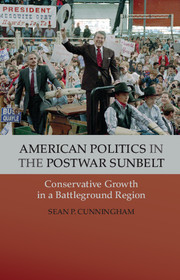Book contents
- Frontmatter
- Dedication
- Contents
- Acknowledgments
- Introduction
- 1 Convergence, Metropolitanization, and Anticommunism
- 2 Race, Rights, and the Liberal Consensus
- 3 Wars against Liberalism
- 4 Southern, Suburban, and Sunbelt Strategies
- 5 Mobilizing the Religious Right in the Politicized “Bible Belt”
- 6 Reagan’s Sunbelt, Reagan’s America
- 7 Shades of Red, Shades of Blue
- Epilogue
- Index
- References
7 - Shades of Red, Shades of Blue
Published online by Cambridge University Press: 05 July 2014
- Frontmatter
- Dedication
- Contents
- Acknowledgments
- Introduction
- 1 Convergence, Metropolitanization, and Anticommunism
- 2 Race, Rights, and the Liberal Consensus
- 3 Wars against Liberalism
- 4 Southern, Suburban, and Sunbelt Strategies
- 5 Mobilizing the Religious Right in the Politicized “Bible Belt”
- 6 Reagan’s Sunbelt, Reagan’s America
- 7 Shades of Red, Shades of Blue
- Epilogue
- Index
- References
Summary
Few events more clearly illustrated the Sunbelt’s powerful influence in national pop culture than the free concert staged by Garth Brooks on August 7, 1997, before approximately 50,000 fans in New York City’s Central Park. A Tulsa, Oklahoma, native, Brooks launched his career as a country music star in 1989. By the time of his Central Park concert, however, Brooks was already well on his way to becoming the third-highest-selling musical artist in United States history, behind only the Beatles and Elvis Presley. Like so many other country artists during the 1990s, Brooks owed a debt of gratitude to musical pioneers including Merle Haggard, Johnny Cash, and Waylon Jennings who had popularized the genre during the 1970s. Beyond Brooks’s obvious status as a premier musical talent, however, his Central Park concert also made clear that country music at the end of the twentieth century had easily transcended regional borders.
Also like other country artists, Brooks made a living singing about populist and blue-collar – sometimes called “redneck” – values and experiences. Offering a window into mythical but idyllic worlds of tradition, nostalgia, and simple living, Brooks and other country singers attracted fans who identified with the music’s oft-contradictory expressions of both frustration and hope, as well as its esteem for small town life. Two of Brooks’s earliest hit singles, in particular, reflected such expressions, while articulating the dichotomous worldviews that made both the Sunbelt and the United States the competitively contested political battlegrounds that they were throughout the 1990s.
- Type
- Chapter
- Information
- American Politics in the Postwar SunbeltConservative Growth in a Battleground Region, pp. 226 - 256Publisher: Cambridge University PressPrint publication year: 2014

